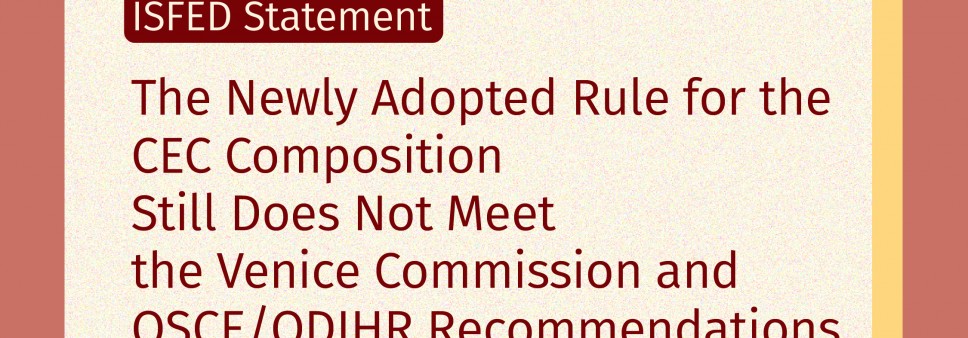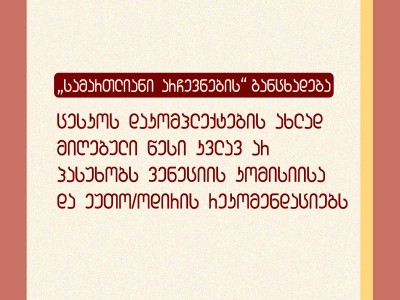The Newly Adopted Rule for the CEC Composition Still Does Not Meet the Venice Commission and OSCE/ODIHR Recommendations
On February 20, 2024, the Parliament of Georgia passed amendments to the Election Code and the Rules of Procedure of the Parliament of Georgia in the third reading. However, these amendments fail to address the primary challenges in the procedure for electing the Chairperson and professional members of the Central Election Commission (CEC) and disregard the recommendations of the European Union (EU), the Venice Commission, and the OSCE/ODIHR. Specifically, candidates for the chairpersonship/membership of the CEC will again be selected by the Chairperson of the Parliament of Georgia and presented to the Parliament. Subsequently, the Parliament will have the authority to elect the candidates for a full term of 5 years with a simple majority. These provisions undermine the CEC's independence and increase a single party's influence over the election administration. Ensuring the independence of the election administration is one of the nine steps outlined by the European Union for Georgia. Therefore, this decision of the parliamentary majority does not facilitate the country's progress towards joining the European Union.
On December 14, 2023, the European Council granted Georgia the status of a candidate country for EU membership. The advancement along the path of European integration hinges on implementing the recommendations outlined in the nine steps presented by the European Commission. One of the steps to be taken by Georgia directly relates to the electoral processes and the implementation of reforms. The EU explicitly requires the independence of the CEC.
The International Society for Fair Elections and Democracy (ISFED) has consistently pointed out the importance of ensuring the independence of the election administration in its reports and statements. One of the main bases for guaranteeing the institution's independence is its formation. Consequently, the regulatory framework governing the composition of the CEC – electing its professional members – holds great importance.
"A way ahead for Georgia", the agreement reached between Georgian political forces on April 19, 2021, mediated by the President of the European Council, Charles Michel, stipulated that the election of the CEC chairperson or professional members for a full 5-year term would require the support of two-thirds of the full composition of Parliament, ensuring political consensus. If this quorum is not met, candidates with limited political support could be appointed to the positions for a period of six months.
With the legislative changes implemented in 2023, the Parliament of Georgia essentially diverged from the spirit of the aforementioned agreement. To elect the professional members of the CEC for a full term, the support of the majority of the full composition of the Parliament became sufficient, potentially enabling the staffing of the CEC through a single-party decision. Simultaneously, the role of the President of Georgia in this process has been diminished and reduced to a mere formality. It should also be noted that the regulation that restricts nominating the same candidate for the vacant position of CEC member/chairperson not more than twice was removed by the 2023 amendments.
The problematic nature of the rule for the CEC composition was highlighted in the mid-term evaluation presented in June 2023 by Oliver Varhelyi, the European Commissioner for European Neighborhood Policy and Enlargement, and reiterated in the November 8, 2023 Communication Document of the European Commission on EU Enlargement policy. According to the EU, Georgia needs to fully adhere to the recommendations of the Venice Commission and the OSCE/ODIHR regarding the procedure for the composition of the CEC.
On December 18, 2023, the Venice Commission and the OSCE/ODIHR published their joint opinion on the aforementioned draft laws, criticizing both the 2023 amendments regarding the composition of the professional members of the CEC, as well as the new draft law passed in its first reading in September. In their joint opinion, these organizations noted that the changes implemented in 2023 provided the ruling party with complete control over the candidate nomination process, allowing for the election of the CEC chairperson and professional members without the support of the opposition. The document also emphasizes the necessity for supporting two-thirds of the parliamentary majority during the election of the CEC chairperson and professional members and the anti-deadlock mechanism outlined in the agreement mediated by Charles Michel. Additionally, the document negatively assessed depriving the President of Georgia of the authority to select and nominate candidates for the CEC chairpersonship or professional membership. Nevertheless, the parliamentary majority disregarded these opinions and made no substantial changes to the version passed in the third reading.


